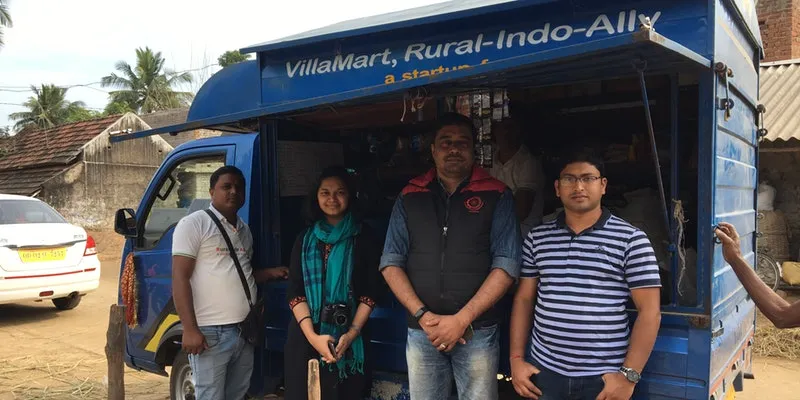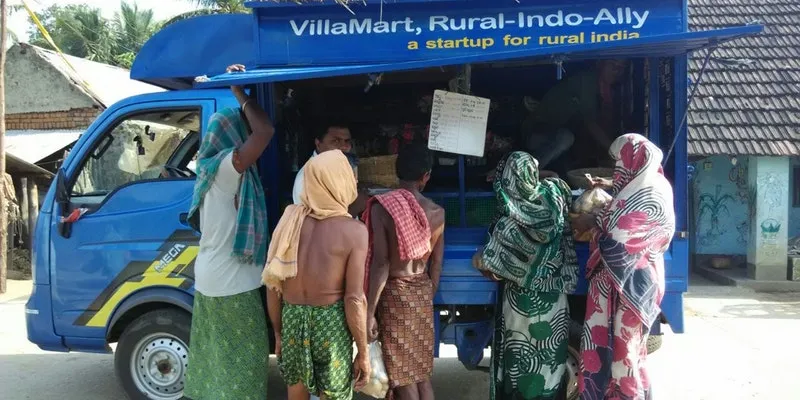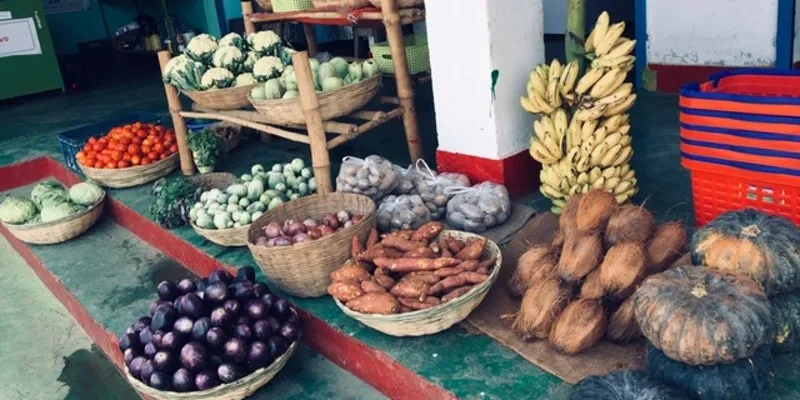This agri startup is weeding out middlemen to get farmers the best price for produce
Founded in 2017, Odisha-based agri startup Villa Mart runs a mobile rural market that buys farmers’ produce at their doorstep for double the price and sells it to villagers. It now has a network of 2,000 farmers across 40 villages.
Basanti Biswal, a tribal woman farmer from Bhiruda, a village in Nayagarh District, Odisha, is the sole breadwinner of her family. She walks nearly three kilometres every morning and takes nearly four to five hours to sell vegetables. Despite her struggle, she usually fails to get the right price as buyers always bargain for lower prices.
Basanti's struggle became a thing of the past when she came to know about Villa Mart, an agri startup based out of Odisha.
Founded by Dr Ramesh Chandra Biswal and Gopal Krushna Pradhan in 2017, Villa Mart is a mobile rural market that buys farmers’ produce at their doorstep for double the price.

Dr Ramesh Chandra Biswal and his team in front of the mobile market.
Villa Mart, which has now penetrated the rural market, currently has a strong network of more than 50,000 people and 2,000 farmers from around 40 villages.
Speaking to Social Story, Dr Ramesh says who met the team during Jagriti Yatra, said “Middlemen fetch the farmers nearly 40-50 percent of the market price and take some extra vegetables free of cost. But with a direct link with us, a farmer gets nearly 1.5 to 2 times of his previous income.”
The journey
After completing his PhD from IIT-Kharagpur in 2015, Dr Ramesh started working as a postdoc scientist at Clemson University, SC, US.
“I am basically a materials scientist, and was working on fuel cell, and thought of building my career in that sector. However, farmers’ suicide was a major issue in 2015-16, and it reminded me of my childhood days and my village,” he says.
Born and brought up in a village in a farmer’s family, Dr Ramesh was aware of the problems faced by a farmer. While in the US, he realised the country was developed because of its grass-root level innovation and its approach in addressing societal issues through research.
After a lot of introspection, Dr Ramesh left his job in the US and returned to his village Khuntubandha in Nayagarh District, Odisha, in August 2016.
How it works
Dr Ramesh says, “The biggest problem we found for the farmers was the market linkage. The selling of farm produce at proper prices is the biggest challenge for a farmer. Also, the availability of daily consumable items at proper prices and quality is quite challenging in rural areas.”
To address this concern, Villa Mart introduced two solutions: a market and a mobile outlet.
Farmers earlier had to go to cities to sell their produce and household items. The mobile outlet, on the other hand, reaches out to them and covers 25 villages on a weekly basis.

Villagers buy local produce and other basic household items at the mobile market.
The mobile outlet is a modified vehicle that has racks, a public address system, Internet Protocol camera, Wi-Fi, light system, billing, and solar cell.
it stocks nearly 300 items, including vegetables, groceries, and essential household products. Every day a mobile outlet covers two to five villages across 40 km, and over 400 customers. The outlet also has in-built refrigeration to keep the produce fresh.
Dr Ramesh says, “There is a vast rural market waiting for this kind of service, and a single district on an average is a market worth more than Rs 100 crore. Presently we are operating in a single district in Odisha, and soon plan to expand to two more districts in the state. Discussions are also going on to expand this model to other states.”
Enabling farmers to harvest better
Villa Mart is focusing on the harvesting part with market linkage, value addition, and branding. Presently, the startup has four directly engaged women employees, and 80 women from different SHGs and FPOs are indirectly engaged.
The startup has a Digitally Controlled Physical Market Chain (DCPMC) as one of its service innovations to deal with the market problem for farm produce.

“We have some IoT and AI-based sensors for early detection of crop disease and proper maturity level,” Ramesh says.
He says, “As farmers are aware of this benefit, they call us and get connected. In addition, they are now showing their willingness to learn new things, to use agri-equipment, and follow us to produce quality product.”
Support and the road ahead
Dr Ramesh and his co-founder pooled in their savings to fund research in the initial days. Later, in 2017-18, the startup was one of the 10 social enterprises selected by Tata Social Enterprise Challenge (TSEC), which brought it visibility.
The founding duo then got associated with INVENT IIT Kanpur and got incubated at Villgro, where they received mentoring and funding support.

For Villa Mart, Startup Odisha has been very supportive; the State also gave the team a grant. The team is now looking forward to getting investors on board for expansion.
Speaking about future plans, Dr Ramesh says, “The physical marketplace is a practical solution in the Indian context, especially for the farm produce. We have a very realistic and powerful model to empower farmers and rural women. Since business is involved in each part of our model, it is easily sustainable with low investment in the beginning. Many local NGOs, individuals, and government organisations are showing interest in acquiring the franchise model.”
(Edited by Javed Gaihlot)








